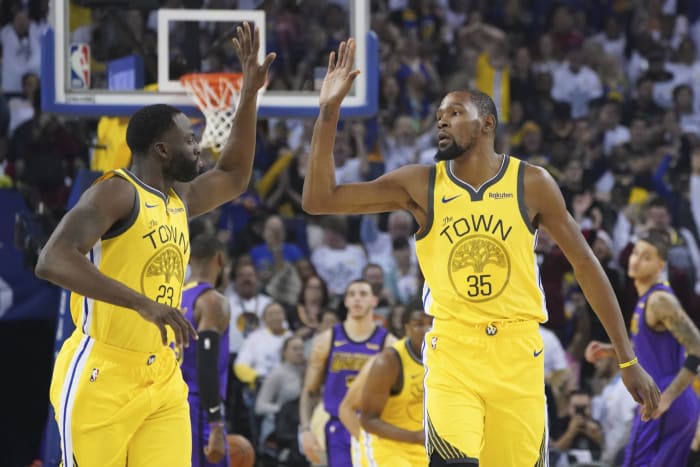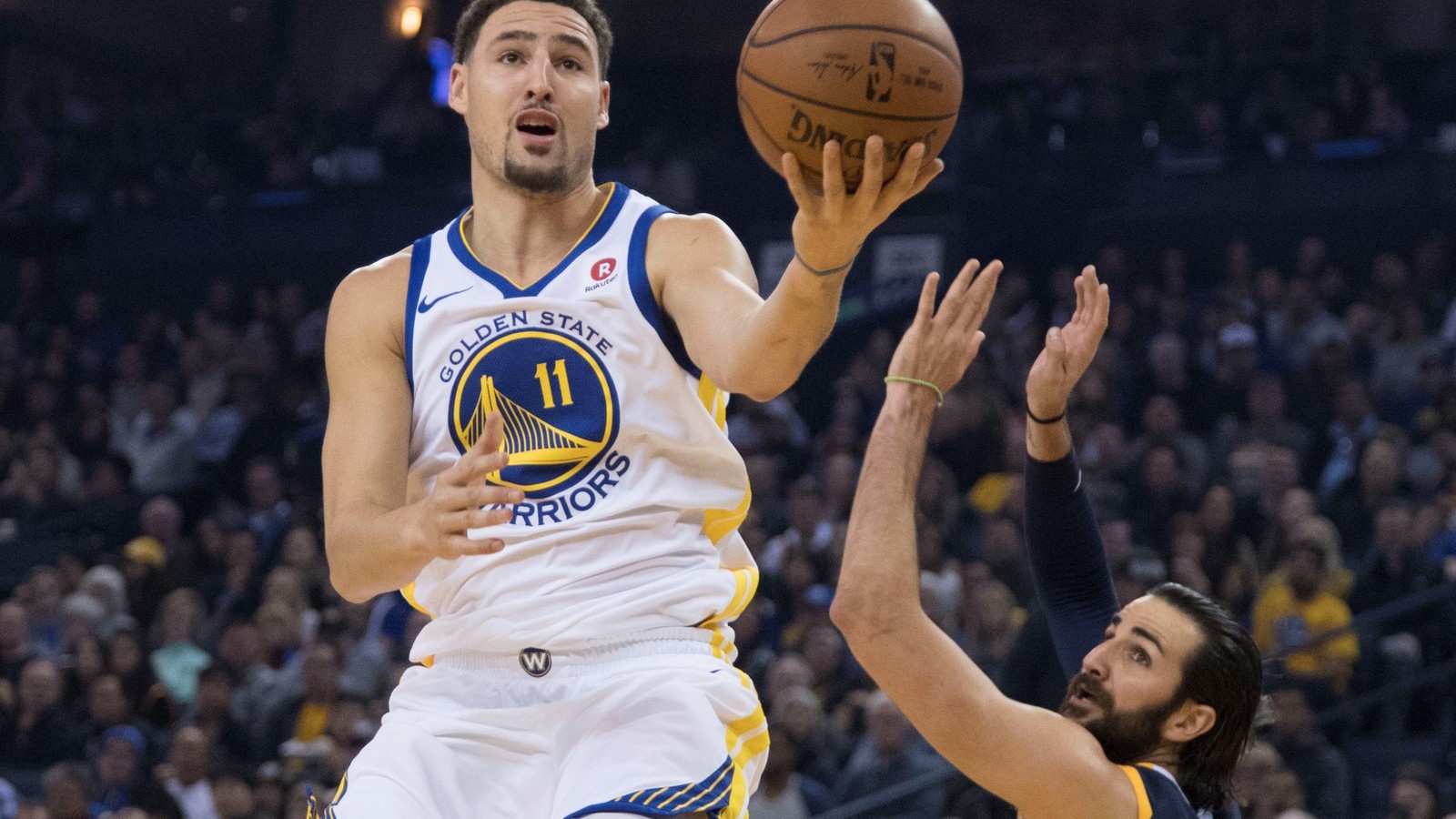
Why 2016-17 Warriors are best NBA team of all time
The 2016-17 Golden State Warriors were an embarrassment of riches. Never before has the NBA experienced a collective sense of inevitable doom as it did when Kevin Durant decided to sign with Golden State in the summer of 2016. The 2017 Larry O’Brien Trophy could have been awarded to the Warriors the moment the ink dried on Durant’s contract.
Yardbarker's NBA "Team of the Century" tournament
But Adam Silver and the NBA made them play out the entire 2016-17 regular season and playoffs anyway. And while it always felt like they had cheated the process, the Warriors flirted with basketball perfection on a nightly basis, going 67-15 in the regular season and 16-1 in the playoffs, nearly becoming the first team to sweep the postseason.
When the final buzzer sounded on the season, the Warriors were the best team in the league, the best team of the decade, the best team of the century … and, in my opinion, the best team in NBA history. They even won Yardbarker's mythical "Team of the Century" tournament.
Here's why their my pick for best NBA team ever.
Star power unlike any team ever
The NBA orbits around its stars more than any other major professional sport in America. With a salary cap, teams are typically limited to two, maybe three star-level players. However, the Warriors were able to assemble more star-level players than any team in history for the 2016-17 season because of three fortuitous breaks:
1. Steph Curry was on the last year of a four-year, $44M extension that he’d agreed to back when his ankle injuries were threatening his career and well before his emergence as a superstar.
2. Despite being an All-Star-level player, Andre Iguodala signed a team-friendly deal to join the Warriors around the same time Steph signed his extension.
3. The NBA’s massive, multi-billion-dollar TV deal kicked in after the 2015-16 season, causing a salary cap spike for the summer of 2016 and allowing the Warriors the requisite salary space to sign another star player: Kevin Durant.
The Big 3 of Curry, Klay Thompson and Draymond Green, plus a star sixth man in Iguodala, gave the Warriors one of the most talented rosters in the NBA. Adding Durant to that mix essentially gave them five star players. Star players are more consistent than role players. Star players get more calls. Star players elevate their games to match up with better competition. Star players win more games.

The Durant fit was damn near perfect from the start
Although his second and third seasons were a little more drama-filled, Durant’s first year in the Bay Area was about as smooth an integration a superstar can have with a team already loaded with talent. Once teams saw how seamlessly Durant slid into the Death Lineup (which became the Hamptons Five), they knew they were in trouble. It wasn’t just that the second-best player in the world joining forces with a team that had finished 2014-15 season with a 67-15 record and the 2015-16 season with a historical 73-9 record. No, the most foreboding part of the KD signing was that the fit was perfect for both Durant and the Warriors.
Durant had never been surrounded with any semblance of shooting in OKC, and suddenly he was playing alongside the Splash Brothers. He’d grown tired of the stagnant offense the Thunder ran and all of the double-teams he’d faced every night in OKC, and suddenly he was shooting wide-open threes and getting isolations whenever he wanted. Durant went on to average a modest (for him) 25.1 points, 8.3 rebounds and 4.8 assists with 54-38-88 shooting splits in the regular season in a career-low 33.4 minutes a game.
The only thing the Warriors were missing on their conquest for basketball perfection was a worthy foil to LeBron James. With Durant, not only did Golden State add the most effortless scorer of all time; it also got a tenacious defender who could play LeBron to a draw … and sometimes even outplay him, like arguably he did in the Finals, when he took his game to a new level, averaging 35.2 points, 8.2 rebounds and 5.4 assists per game with 56-47-93 shooting splits.

The entire team was hungry
Bringing aboard a then-ringless Durant obviously added some fuel to the Warriors’ fire, but it wasn’t like Curry, Klay, Draymond and Iggy weren’t already motivated after losing in Game 7 of the 2016 NBA Finals and missing an opportunity to cap off the greatest season ever with a championship.
Curry, who was coming off a unanimous MVP season, dialed it back in the regular season a bit (25.3 ppg., 6.6 apg., 4.5 rpg. with 47-41-90 shooting splits), but he was superb in the playoffs, averaging 28.1 ppg., 6.7 apg., 6.2 rpg. with 48-42-90 shooting splits. Thompson was his usual excellent self during the regular season (22.3 ppg. on 47-41-85 shooting) — who can forget his 60 points in 11 dribbles game? — and played incredible defense all postseason. And even though Green became a little redundant with the addition of Durant, he found a way to make another First Team All Defense and stuff the stat sheet in the playoffs, averaging 13.1 points, 9.1 rebounds, 6.5 assists, 1.8 steals and 1.6 blocks. The Durant-Thompson-Green-Iguodala defensive unit was equipped to cover the modern NBA offenses as well as any we’ve seen this decade.

This was basketball nirvana
The 2016-17 Warriors achieved a higher form of the game. Remember the beautiful basketball the 2014 Spurs played in Games 3 through 5 of the NBA Finals? That was the Warriors nearly every night, only they were a more efficient, star-studded team — more or less an All-Star team. Golden State set the then-NBA record with a 115.6 offensive rating and combined that with a stifling 104.0 defensive rating. The Hamptons Five lineup (Durant-Curry-Thompson-Green-Iguodala) outscored opponents by 23.4 points per 100 possessions during the regular season. And in the postseason, it was an even more dominant 27.0 points per 100 possessions. Anytime the Dubs fell behind, this lineup would bring them storming back in the blink of an eye.
One final reason these Durant Warriors were the best of this century is because they stampeded through the playoffs unlike any team ever, save for the 2000-01 L.A. Lakers (which unsurprisingly finished second in Yardbarker’s Team of the Century Tournament). They whooped the Blazers by an average of 18 points in four games in the first round of the Western Conference Playoffs. They trounced the Jazz in the second round by 15 points per game (and ripped Salt Lake City’s nightlife to add insult to injury) in a four-game sweep. In the Western Conference Finals, they took full advantage of an injury to Kawhi Leonard and blasted the Spurs (61-21) in a sweep by 16 points per game. And in the Finals, against a Cavaliers team that had gone 12-1 in the Eastern Conference and had a historically good offense of its own, the Warriors beat the Cavaliers four games to one. Golden State beat Cleveland by an average of 13.75 points per win.
The combination of talent, basketball fit, hunger and execution that was the 2016-17 Warriors was unlike anything we had ever witnessed in the NBA to that point. It’s unlike anything we’ve seen since. And considering all of the unlikely circumstances that occurred to bring this collection of talent together, it’s unlike anything we’re ever going to see again.
That is why they are Yardbarker’s Team of the Century.
More must-reads:
- 32 teams, one champ: NBA 'Team of the Century' tournament
- Why Giannis-fueled Bucks lose most if NBA scraps season
- The 'Most points in a playoff game by team' quiz
Breaking News
Customize Your Newsletter
 +
+
Get the latest news and rumors, customized to your favorite sports and teams. Emailed daily. Always free!

